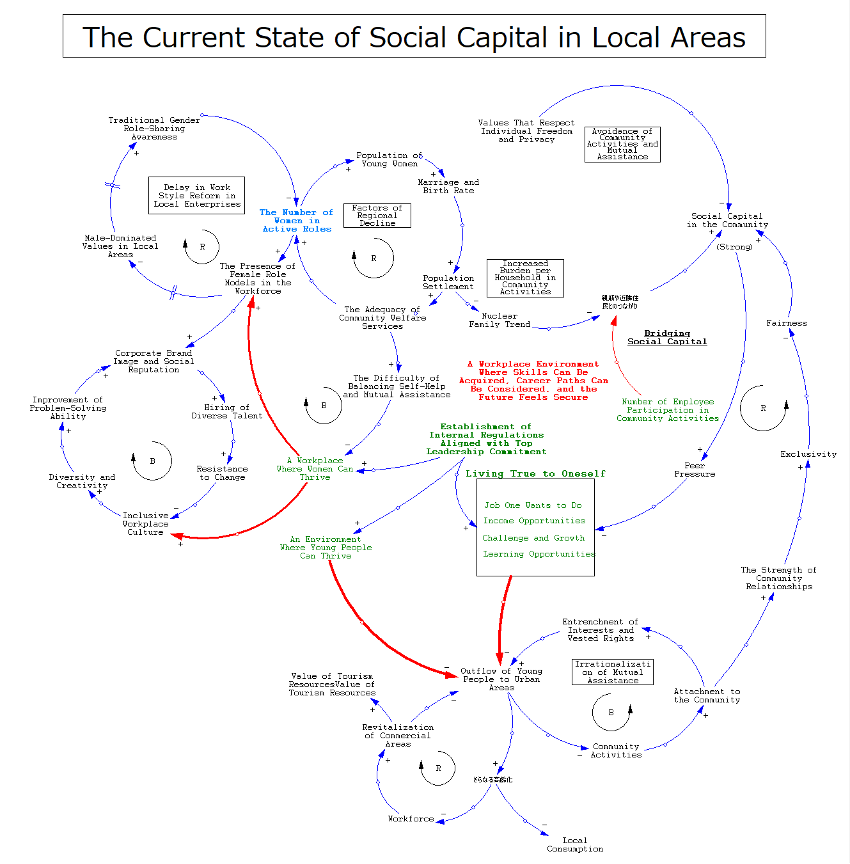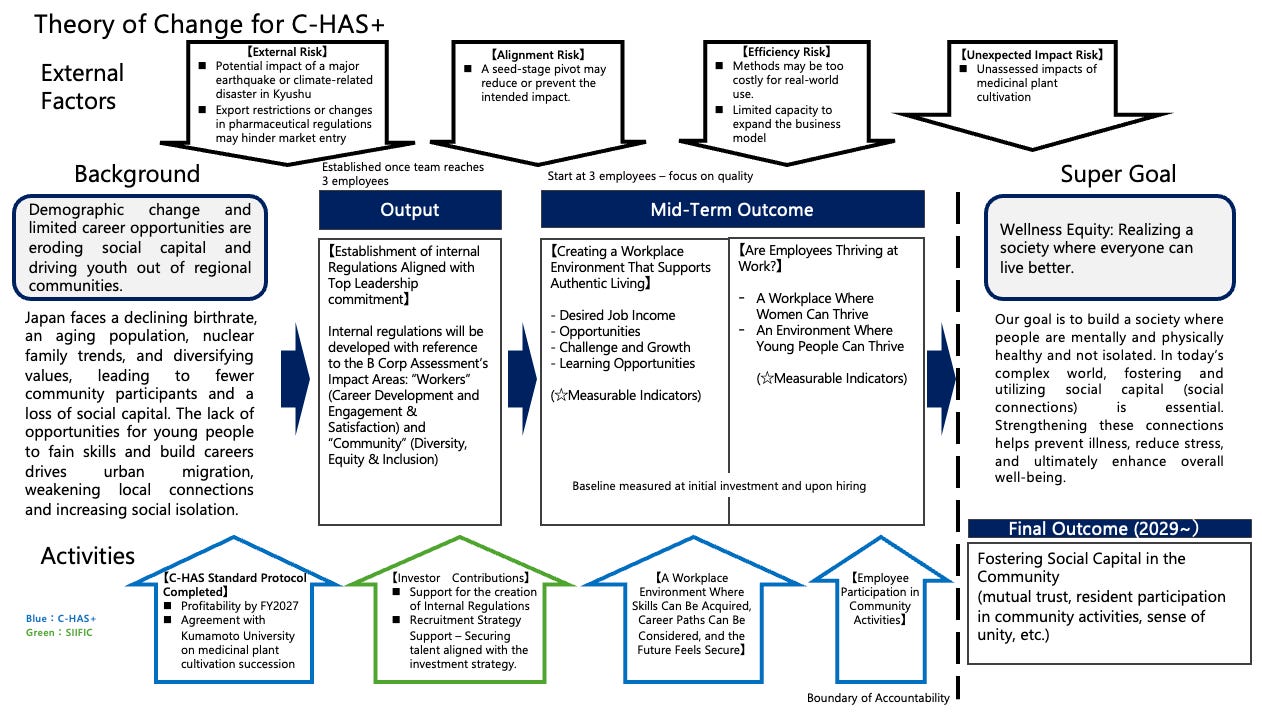C-HAS+: Pioneering Wellness Innovation and Creating Opportunities for Young Researchers in Kumamoto
The SIIFIC Wellness Fund, jointly managed by SIIFIC and SIIF, has announced an investment in C-HAS+, a biotech originating from the School of Pharmacy at Kumamoto University.
At its core, the SIIFIC Wellness Fund pursues the “suer goal” of Wellness Equity, a society where everyone can live better. To advance this vision, the Fund has identified two leverage points: advancing wellness literacy and building social capital. Its Theory of Change (ToC) sets out four investment themes. The latest investment in C-HAS+ falls under Theme 4: Startups that create jobs in regional areas and foster vibrant, livable communities.
A Life Sciences Venture Built on Kumamoto University Research
Kazu Umeda, Co-Founder and Representative Partner, SIIFIC : The origins of C-HAS+ date back to 2017, when Kumamoto University and Kumamoto Prefecture were selected for the Ministry of Education, Culture, Sports, Science and Technology (MEXT)’s “Regional Innovation Ecosystem Formation Program” launched the year after the 2016 Kumamoto Earthquake. At the time, I served as a ministry committee member and witnessed the very beginning of this initiative, which aimed to transform university research into new industries rooted in Kumamoto.
Reiri Miura, Co-Founder and Representative Partner, SIIFIC : Established in 2019, the company is still in its early years, with just three employees. It remains at the seed stage, but is now poised to move towards commercialisation.
Kazu : C-HAS+ has developed a pioneering service that uses C.elegans, a microscopic nematode with a lifespan of only 30 days but with organs such as nerves, intestines, and muscles, as a substitute for animal testing. Their world-first system evaluates how food and pharmaceutical ingredients affect healthy lifespan. This approach not only reduces the need for animal testing but also delivers quicker and more affordable data.
The company is already generating revenue sufficient to cover its fixed costs, and promising next generation projects are under preparation. Our investment is, in essence, a founder-stage investment, where we have worked closely with the management team to map out the business roadmap, estimate annual costs, and set clear milestones. I will also join the company as an outside director (CFO/CIO), ensuring that we grow together from this early conceptual stage.
Startups Creating Regional Jobs and Vibrant Communities
Kazu : In assessing C-HAS+, we revisited the system map developed for Investment Theme 4. While indrusties differ, the impact KPIs remain the same, creating income opportunities, enabling challenge and growth, an offering young people and women a place to thrive.
Nanako Kudo, Executive Director, SIIF : Our discussions clarified that this investment theme is closely tied to strengthening social capital. In many regions, where work style reforms are slow to take root, young people, particularly women, lack career opportunities and leave for the cities. This outflow erodes community vitality and weakens social ties. The solution lies in building workplaces where young people can live and work with pride in their local communities.
Whereas Proximar was an example of a Norwegian company choosing Oyama Town in Shizuoka Prefecture as its base, C-HAS+ was born out of Kumamoto University, a deeply rooted local educational and research institution. This is a startup that seeks to contribute to its community, creating not only economic value, but also supporting the ability of those who work there to live in ways that feel true to themselves, That is the kind of impact we envisage.
Yuta Kumo, Impact Officer, SIIF : C-HAS+ was founded by faculty members of Kumamoto University’s School of Pharmacy. Dr. Tsuyoshi Shuto, Associate professor of Kumamoto University and President/COO of C-HAS+, has guided students in their career paths, particularly in drug discovery and life sciences. The company accepts paid student interns, giving young researchers valuable opportunities to gain skills and confidence.
Reiri : Many women chose to study pharmaceutical sciences. However, research careers beyond the pharmacist qualification are very limited. With so few pharma research centers in Japan, C-HAS+ represents a rare and invaluable opportunity - a company where researchers can remain in the regions and continue their scientific career.
Theory of Change in Action: Building Evaluation Method Alongside Growth
Kazu : While the specific activities and external factors are tailored to each company’s stage, the ToC backbone, covering context, outputs, mid-term outcomes, desired state, and ultimate outcomes, remains common to Theme 4.
Reiri : Our output here is the establishment of workplace policies aligned with top-level commitment, supported by investor’s contribution. This includes assisting with Work Rules and Internal Regulations, ensuring staff can work in a fair and supportive environment.
Nanako : As hiring ramps up, we hope to see more young people and women actively joining.
Reiri : The mid-term outcomes we aim for are workplaces where staffs can gain skills, build career paths, and feel secure about their future. In interviews with interns, I sensed that such an environment is already beginning to emerge.
Nanako : The KPIs, opportunities for meaingful work, income, growth, and learning, will be measured against Japan’s Regional Well-being Indicators, published by the Digital Agency. While Tokyo naturally dominates these metrics, our ambition is to create a Kumamoto-based company where individuals can say with pride: ‘I am earning well, doing work I love, and continuing to grow here.’ That achievement would mark a significant breakthrough.”
Reiri : We must ensure income opportunities rival those in Tokyo. Talented people won’t stay if pay falls behind. Fair rewards, wherever you work, are the key to keeping talent and making real impact.
Nanako : Our goal is to strengthen social capital, so we are currently designing a survey with reference to the Regional Well-Being Indicators.
Yuta : Building on existing indicators, we are working with Dr. Shuto and the C-HAS+ team to design impact measurement tools that reflect both comparability and the company’s unique identity. To our knowledge, few, if any, Japanese companies have attempted to measure and disclose workplace well-being in this way. C-HAS+ could become a pioneering case study in impact measurement and management (IMM).
Reiri : A distinctive feature of this investment theme is its use of public indicators that anyone can access. Setting IMM metrics remains a major challenge for impact investors, so creating a reference case in itself may be a valuable contribution.
Nanako : Ultimately, we hope that this ToC and IMM framework can also be adopted by regional banks. The aim of creating workplaces where younger generations can thrive and strengthening social capital is not only relevant for startups, but something that established local companies can share as well.
A Leadership Team with Global Ambition
Yuta : Kumamoto University has long encouraged entrepreneurship. Dr. Shuto himself never envisaged becoming a founder, but at 44, he stepped into the role to show students there are pathways beyond pharmacy, paths where research, business, and social contribution intersect.
Kazu : The company’s foundation was led by Professor Emeritus Hirofumi Kai, a former vice president of Kumamoto University, who has since stepped back to support as CSO. Alongside him, Masahiko Kikuchi, a seasoned pharmaceutical executive, has taken on the role of CEO, ensuring professional leadership. This multi-layered structure demonstrates strong succession planning and ambition to become a global enterprise.
Reiri : Although the company is still at the seed stage, I sense a strong mission to avoid over-reliance on individuals and to pass the baton properly, with the aim of building a global enterprise from Kumamoto. Dr. Kai’s vision has been inherited by Dr. Shuto, who is mentoring younger colleagues and students. With this investment, our own Partner, Kazu, has now joined as a finance specialist. It is a very well-balanced management team.
As an aside, during our field interviews we noticed an unexpected common thread between Proximar and C-HAS+: the prominent role of women from abroad.
At Proximar, there was a staff from Indonesia who studied at a Japanese graduate school, returned home, and then came back to Japan in search of further opportunities. At Kumamoto University, which collaborates closely with C-HAS+, there is Dr Mary Ann Suico, an assistant professor from the Philippines. She earned her Ph.D. at Kumamoto University, conducted research in the United States, but ultimately chose to return, saying that Kumamoto was where she truly wanted to be.
Known affectionately to students as “Ann Sensei (Teacher Ann) ”, she also mentors female interns, giving them not only guidance but also a global perspective while rooted firmly in the local community. At a time when female role models in science remain few, her presence is particularly significant. It was an intriguing discovery, an impact that does not appear on any systems diagram, yet speaks volumes.
For the original Japanese article, please visit the SIIF blog.
At SIIFIC, investments into Proximar and C-HAS+ are only the beginning. We remain committed to pursuing Wellness Equity, a society where everyone can live better, by supporting startups that not only innovate, but also help weave stronger social ties. Together with these entrepreneurs, we aim to build communities where people can truly thrive.



